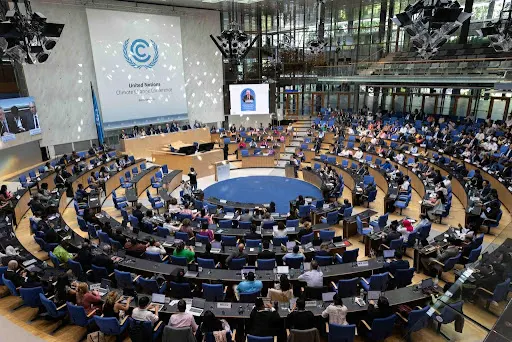By Ephraim Agbo
As world leaders gathered in Seville, Spain, this week for a major UN summit on climate finance, the stakes couldn’t be higher — especially for countries like Nigeria. The summit’s goal is clear: help developing countries access the funds they need to tackle climate change without piling on more debt.
But as Nigeria’s delegation made its case on the global stage, many observers were left asking: Is Nigeria here for solutions — or sympathy?
🇳🇬 Nigeria’s Pitch: We Need Funding — Just Not Debt
Representing Nigeria at the summit is Finance Minister Wale Edun, who laid out a familiar narrative:
“Nigeria is here to explore new financing tools to support our macroeconomic reforms and development priorities — particularly in agriculture, health, and infrastructure.”
He warned of shrinking aid flows, and pointed to the alarming reality that many poor countries are now repaying more in debt than they receive in aid — a claim backed by the OECD and UNCTAD, which estimate a $4 trillion shortfall in funding needed to meet the Sustainable Development Goals (SDGs).
Edun's tone was both urgent and pragmatic. Nigeria isn’t begging, he insisted — it’s seeking partnerships and smarter financing options, like:
- Green bonds
- Climate-linked concessional loans
- Blended finance mechanisms
💰 The USAID Cuts: Real Crisis or Convenient Scapegoat?
Edun didn’t ignore the elephant in the room — the $800 million USAID cut to Nigeria’s health sector. But he played it down:
“With greater efficiency, better procurement, and cutting overheads, we can replace that $800 million with just $200 million from our budget.”
That sounds impressive — but critics say it sounds a little too convenient.
Dr. Bina Okeyo, an East African development economist, questions the math:
“How does a country that consistently underfunds its health sector suddenly promise to triple efficiency — overnight? That’s not reform; that’s spin.”
👀 Other Perspectives: Aid Isn't the Problem — Corruption Is
This is where the controversy heats up. While Nigerian officials talk about debt, climate change, and innovation, many experts and citizens are asking why the same urgency isn't being applied to corruption and accountability.
Roy, a listener from Uganda, bluntly put it:
“The Finance Minister talks reforms but avoids naming Nigeria’s real disease: corruption. No tech tool or AI will fix that.”
Dr. Abdul Kareem Dam, a Nigerian governance expert, echoed that sentiment:
“Nigeria’s funding problems are not rooted in a lack of aid or tax reforms. They’re rooted in elite looting, opaque budgets, and political impunity.”
And the numbers support their view. Nigeria ranked 145 out of 180 countries on Transparency International’s Corruption Perception Index (2023) — worse than war-torn Syria and barely above Myanmar.
🔍 A Closer Look: Are These “Reforms” Real or Cosmetic?
To his credit, Minister Edun pointed to recent moves:
- Fuel subsidy removal, expected to save over ₦4 trillion annually
- Efforts to expand the tax-to-GDP ratio (currently at a low 10.8%)
- Digitizing government processes
- Courting the private sector to invest in Nigeria’s recovery
But again, critics say the execution is half-baked.
“Subsidy removal without safety nets is a ticking time bomb,” said public policy analyst Alex Akande. “You don’t fight poverty by making fuel and food more expensive with no social protection.”
🌍 The Global Angle: The West Isn’t Innocent Either
Now, let’s be fair. Nigeria’s challenges are serious, but the global financial system is also stacked against developing countries.
- According to UNCTAD, low-income countries spend more on debt servicing than climate adaptation.
- A report by Oxfam accuses rich countries of using “climate finance” as a smokescreen — repackaging old aid as new commitments, and giving loans instead of grants.
- Multinational corporations dodge taxes worth over $90 billion in Africa each year, while countries like Nigeria are told to “increase tax collection.”
So yes, Nigeria has work to do. But the global hypocrisy is real too.
🎯 Final Thought: Is Nigeria a Victim — or Its Own Villain?
Nigeria’s presence in Seville is important. The country deserves fair financing, and the world should support its climate and development goals.
But let’s not pretend:
- Aid isn’t the core problem — corruption is
- Debt relief without fiscal discipline just resets the cycle
- Reform must be more than buzzwords in global forums
If Nigeria wants to be taken seriously on the global stage, it must do more than talk. It must prove it can govern transparently, spend wisely, and protect its people — with or without foreign aid.
Until then, summits like Seville will feel less like solutions — and more like a stage for political theater.












No comments:
Post a Comment